by botoxtraining.org
Injectable cosmetic fillers, also known as dermal fillers, consisting either of a solution of hyaluronic acid or a weak solution of botulinum toxin (Botox) that is used to fill in the area under the skin, plumping it up to reduce fine lines and wrinkles. Fillers can also be used to plump up thin lips, reduce the appearance of scars and add definition to the jawline, cheeks and other parts of the face. Depending on the brand, the the solution varies in viscosity and may be either natural or synthetic.
What Constitutes A Good Botox Training Program?
Seems pretty simple, but the variety of brands, the various parts of the face they can be used on and the issues the procedure is intended to address, all of these factors require different techniques and skills, all of which need to be practiced. Considering all of this, it’s easy to see why it is impossible to cover everything in one day. A good Botox certification program will teach, and give you the opportunity to practice, the easier and more forgiving skills and techniques first and allow you to gradually work your way up to the trickier areas that are less forgiving of mistakes. You’ll get a great deal of practice in the training program so that you can feel confident that you will get it exactly right with your clients and patients.
Why Take Botox Training?
Injectable fillers are the second most commonly sought non-surgical procedure for performed for cosmetic reasons in the United States. Every year, 4 million people get dermal injections for a variety of reason. Soft tissue enhancement treatments have increased by 7% each year for the past five years. With immediate and enduring results, 90% of people who have this done are pleased with the outcome.
There are an estimated 60 million people in the United States that comprise the market for aesthetic procedures and the demand for aesthetic treatments, especially non-surgical procedures, is expected to continue to rise until 2025. These procedures are especially popular because they can last for months without the typical risks and expense of surgery, and with minimal side effects. It is increasingly popular among medical and aesthetic professionals because the average fee to offer these treatments is around $400 per syringe a cost many people are willing to pay to look younger and feel more confident. Insurance often does not cover the cost of cosmetic procedures, so offering them to your clients saves you the hassle of dealing with insurance companies.
To register for Botox Training, visit http://dentox.com/botox-training